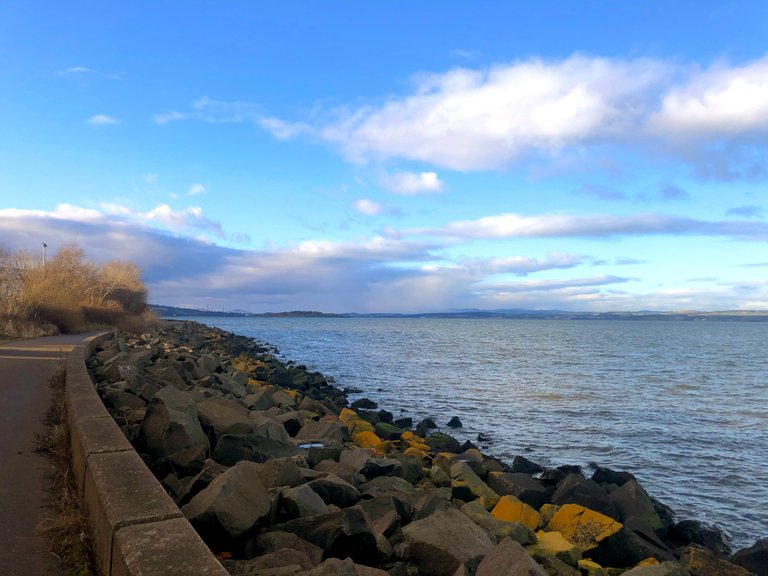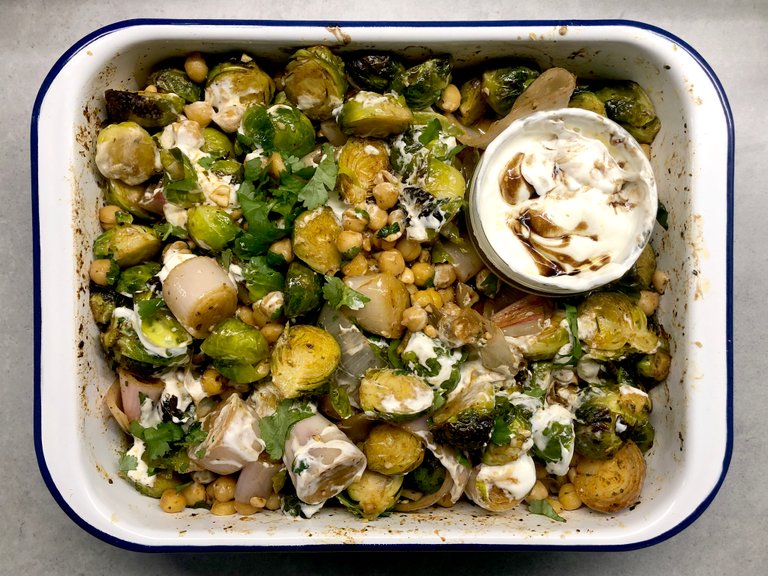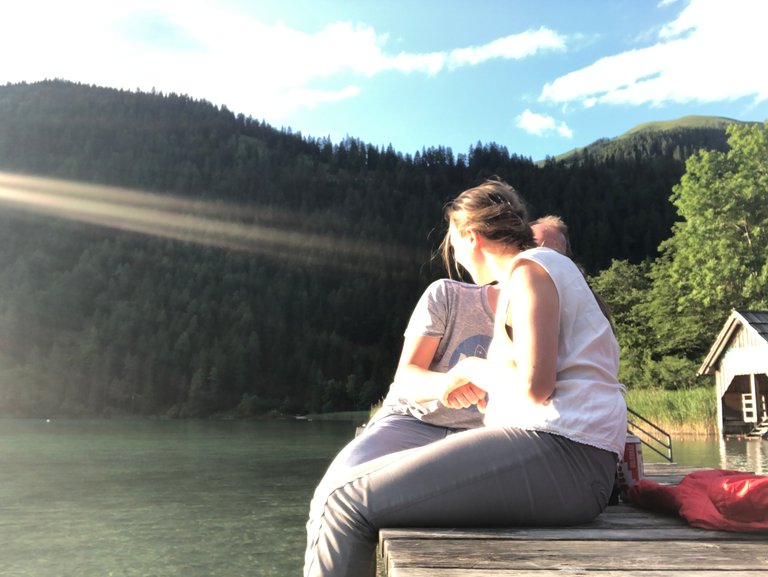Even in the best of worlds the soul needs refurbishing from time to time. I've deliberated over whether to post this piece for a while, but in the end decided to share it. Because #life happens, as we know, and Hive really is the most warm and supportive place. I feel I can be raw, myself, here.
If you see this blog, and are inspired by its content, please join the chat below. @atma.love, a while back you initiated a thought-provoking answer to my #introduceyourself post regarding illusory duality and consciousness. I’d love to read your viewpoints on the topic of soul-searching, which is what this post seeks to deliberate on in a roundabout way. @brijwhiz, knowing your reflective nature, perhaps you might also contribute your insights below? And @alessandrawhite, a new pal, this is a step away from my ode to Robbie Burns - but I’d so appreciate your evaluation.
 Mid-run on the Silverknowes Esplanade, Edinburgh
Mid-run on the Silverknowes Esplanade, Edinburgh
In times of hurt, loss, or confusion, seeking advice often leads to the common refrain: “occupy yourself”. Society, parties, events, family, friends - these become the recommended distractions. But I have to ask, why is it that, when seeking solace, we are seldom advised to spend time alone with ourselves? During significant life changes, the prevailing counsel is to swiftly pick ourselves up, re-engage with the world, and drown out sorrowful thoughts. We’re made to question whether spending time alone with one’s feelings is inconsequential or dangerous, particularly after a major upheaval like death or divorce. I want to challenge this perspective and expose distractions for what they are: detrimental.
In my mid-20’s, I broke up with my first serious boyfriend. I was left stranded by myself in a foreign country. The advice I received from friends and family back home was: “Don’t dwell on it, what’s done is done, move on, chin up, be strong.” I was encouraged to take on more work, go out, meet people, join a club. By filling my time up with distractions, I bypassed the grieving and self-soothing period. Popular opinion led me to believe that finding purpose in every moment was virtuous, and selflessness was synonymous with gifting my time to others. Looking back, I believe this period marked a turning point in my attitude towards Self and Other – my mindset shifted to develop the following two disheartening mantras: the first, that I didn't deserve my own time; the second, that core complications can be left unsolved. “Time heals all wounds” – why spend agonising moments trying to fix something you can circumvent with distraction? I found more purpose in attending soroptimist gatherings than sitting with and working on myself.
As the years went on, and bad experiences came my way, these were dealt with in the same manner: initial outbursts of emotion squelched beneath new distractions. I was cocooning myself within the comfortable shades of my own self-made reality, accepting illusion as truth. In Together, Dr. Vivek H. Murthy describes distractions as threats to cultivating inner strength, hindering self-value and meaning – the sources of joy and wonder that would normally make us feel connected to the universe around us. “This blindness can allow us to drift off course, forgetting what we love about our lives and neglecting to accept and befriend ourselves with the compassion and understanding that we deserve.” While self-reflection demands time and solitude, it also activates brain regions responsible for infusing meaning into our lives; strengthening our identity by giving us the space to connect with ourselves.
 Experimenting in the kitchen: homemade crispy tamarind sprouts with peanuts and shallots, served with flatbread and yoghurt
Experimenting in the kitchen: homemade crispy tamarind sprouts with peanuts and shallots, served with flatbread and yoghurt
My catalyst for change was a fight with someone I hold very dear. The tension in our little house had reached its climax in the New Year, culminating in a final farewell. Numbly, I took to safety in hiding, licking my wounds, absorbed in a feeling of the greatest pain – where your chest feels like shattered glass; one moment you’re wound up so tight it hurts to breathe and the next you feel like water flooding through cupped fists. Ironically, life had repeated itself: as before, I had just relocated to a new city where I know no one outside of work. But this time the decision to go alone had not been mine to make. My partner, my best friend, was no longer there, and in his wake he had uprooted my sense of love, faith, commitment, and support. I kept asking myself how I could have got myself into this situation. Love doesn’t make people do things like this. I felt so gullible, so weak, so let down by somebody I wholly trusted.
I asked myself what I should do. What distraction should I pick up? What club should I join? What friend should I call? And in response to all this brain chatter, I picked up my computer and did something I should have done years ago. Whilst in the airport, waiting to board my flight back to Edinburgh, I slowly but surely began to drop out of the busying, brewing, bubbling world – I stepped down from several volunteer positions that were unsatisfying, quit teaching English, distanced myself from a variety of social media platforms. For the first time in a decade, I completely cleared my calendar. And as my timetable emptied, I felt myself expel a happy, strained sigh. My shoulders sagged and the beat of my heart began to slow. This was the answer I’d been looking for.
The journey ahead, alone and without distractions, can look gruelling. It’s unrealistic to anticipate a smooth transition through hard times. However, avoiding facing your problems is almost certainly a form of repression. Your feelings deserve the courtesy of your attention, even if that means that you have to face the pain of loss. Or the pain of fronting your financial instability. Or the pain of accepting a monstrous health challenge. Or the pain of being cheated by someone you trusted. By ignoring or retreating from impossibly challenging moments in your life instils waves of panic, anxiety, and depression. These toxic emotions can bottleneck in a moment or, like me, they can form the undercurrent in a seemingly sound existence – bathing everything good in a pool of doubt, critique and irrational thinking. Self-awareness can help us find constructive ways to address discomfort. A chasm exists in not knowing who you are when you’re expected to meet the wider world as an individual. You should never depend on others to fix your problems for you. Or pretend that they are not there. I am now learning that self-Knowledge is not egotistical and self-aggrandizing... it’s simply fundamental. As Søren Kierkegaard says, “The most common form of despair is not being who you are”.
The freshness one feel’s after allocating personal time for brooding, fitness, hobbies, planning… it’s character-developing, it’s calming, it’s knowing who you are and kindly letting yourself enjoy life too because you also deserve to be happy. And I sympathise with those who suffer great hurts. I fully comprehend why, when distraction presents itself, you take it because it’s easier to mask the pain of grief than it is to face it. Sitting with it can be too demanding, too overpowering, too soon. But eventually there will come a time when you’re ready. And when you face that moment, do yourself a favour and gift it to yourself. Don’t waste it on distraction. A more fulfilling way to transubstantiate or dissipate hard times is to meet them directly. That is true strength.
 On the shore of Weissensee, Austria
On the shore of Weissensee, Austria
Recently, I came across the following quote by Thomas Merton in The Wisdom of the Desert"... What can we gain by sailing to the moon if we are not able to cross the abyss that separates us from ourselves? This is the most important of all voyages of discovery, and without it all the rest are not only useless but disastrous." In a world that rushes forwards, daring us to keep up, solitude may seem wasteful or unattainable. It demands a certain amount of courage to step away from distractions and look inwards. Sometimes it takes breaking one’s heart to realise we’re lost and in desperate need of finding ourselves. Amidst all the chaos that abounds us as individuals, taking pause sustains us.
This will be a lifelong work… but I am grateful it began with you. x
Thanks #Hive for allowing me to get these feelings off my chest; a soft, but hopeful contribution to the boundless ether.
I think this is the type of content we should be sharing. Now especially.
Off with the love and light head. And into the unconscious we should go. Asap.
🤗 Thanks @nickydee.
An unfamiliar combination of unfamiliar products. but the food looks interesting :)
Well, I'm glad you liked the food. I did, too. 😅
I am going to do something silly and write another comment. Apologies if it looks like duplication but I love clearly threaded items and this comment is not the stream of consciousness that the last one was. Rather I just wanted to add some things I have noticed in our world's culture, typically a bit older than the modern one, which seems to signify that people of yore have thought on some of the points you bring up and they have tried to tackle it in different ways.
Not allowing people to be alone.
I have seen in multiple parts of India that whenever there is a major event, good or bad, the main protaganists are never left alone. For eg, a groom or bride will have their cousins and friends around them 24x7 from a few days before the marriage till the event itself. Same happens when someone passes away, so faces a bad deal in life. Someone is immediately partnered with you. For the most part it seems to me a case of people not wanting the affected person going into any kind of unwanted mental loop and do something untoward. Instead having someone around to keep talking, to keep pulling your attention to mundane tasks, and provide a sounding board, might help bleed out any pressure that is building up. In India there are pretty much elaborate rituals for it, but I feel at least with death, all ancient cultures have something akin to a burial requiring community to come together followed by some kind of wake when people can check in with the affected family.
Pushing people to forget the matter
This seems to me to be more of a modern problem. Afaik in my grandfather's generation almost all activities were so much of a society norm or ritual that there were very few things which did not have a process attached to it. That process would occupy you but not necessarily keep you away from grieving. But today's fast world where "time is money", there is no longer enough time available for the luxury of grieving. As an outsider the only way i have seen the western world solve it is through therapy. where essentially the process is sanctified as required by a professional which then allows society a formal reason to allow you to grieve. In the eastern world even that therapy approach is pooh poohed. There is work to be done, money to be minted to pay for the burial, the cremation, the 2-3 months of hospital charges that now need to be paid, etc. in case of someone passing away for eg. This was not the case when people in my grandfather's generation passed away. If there is a death in the village most men in the village will take a leave and go to the cremation to pay their last respects. Then spend some time with the family. After a certain prescribed nos of days they would again take leave to go and visit the family for a wake like ceremony. Nowadays we just don't have enough time for that.
Self care v/s Selfish
Sacrifice and selflessness are two words which are too deep into our culture especially in populous developing countries like mine. Even hard core capitalists here will talk about these words, that is how deep it is. In this scenario to take care of oneself is never going to be easy to do. And it will be double hard for the female gender, where somehow the expectation is to be even more sacrificing and self effacing :(
I don't know how to solve it tbh. I do feel my ancestors did do a bit better with their talk on importance of mediations and self reflections. But no way to confirm on that.
Ok that's what i was thinking of when i was reading through the post. I don't know how much it reflects the post and how much is just a distraction :) But I will just leave it here for now :)
Ah 🧡 Thank you @brijwhiz for taking the time to share your thoughts!
It's clear that you've given considerable introspection to your own journey and the societal and cultural aspects that shape our experiences. Certainly, I resonate with your fear of delving too deep into oneself and the potential consequences it might have on those who depend on you... It really is a delicate balance between self-discovery and fulfilling responsibilities to others, isn't it? I understand that it can be difficult. I hope your experiment in moving towards a more active reflective state proves insightful.
Your observations about societal norms and practices, particularly in India, offer a unique perspective here. Food for thought. The contrast between past and present approaches to grief and self-care is intriguing, and the comparison you have made with your grandfather and his generation also raises questions about the evolving dynamics of our fast-paced world. So, thank you also for expanding on the cultural aspects and traditions related to grief and self-care. Your insights have added depth to this conversation, and it's valuable to consider how societal norms shape our responses to personal challenges.
It's been very rewarding, reading through your comments. Great unpacking. Really, thank you again for sharing. Giggled at the thought of this being read out in a robotic male voice, haha! What a thought. Hugs back.
Congratulations @actaylor! You have completed the following achievement on the Hive blockchain And have been rewarded with New badge(s)
Your next target is to reach 800 upvotes.
You can view your badges on your board and compare yourself to others in the Ranking
If you no longer want to receive notifications, reply to this comment with the word
STOPCheck out our last posts: